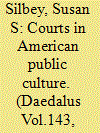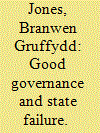| Srl | Item |
| 1 |
ID:
132773


|
|
|
|
|
| Publication |
2014.
|
| Summary/Abstract |
In American public imagination, courts are powerful but also impotent. They are guardians of citizens' rights but also agents of corporate wealth; simultaneously the least dangerous branch and the ultimate arbiters of fairness and justice. After recounting the social science literature on the mixed reception of courts in American public culture, this essay explains how the contradictory embrace of courts and law by Americans is not a weakness or flaw, nor a mark of confusion or naïveté. Rather, Americans' paradoxical interpretations of courts and judges sustain rather than undermine our legal institutions. These opposing accounts are a source of institutional durability and power because they combine the historical and widespread aspirations for the rule of law with a pragmatic recognition of the limits of institutional practice; these sundry accounts balance an appreciation for the discipline of legal reasoning with desires for responsive, humane judgment.
|
|
|
|
|
|
|
|
|
|
|
|
|
|
|
|
| 2 |
ID:
120446


|
|
|
|
|
| Publication |
2013.
|
| Summary/Abstract |
Current international policy discourse routinely characterizes the condition of African states in terms of either 'good governance', on one hand, or 'fragility' and 'failure', on the other. This conceptual vocabulary and analytical approach has become entrenched within the public imagination more broadly, and is reproduced in academic analysis, largely without serious questioning or critique. Some scholars, however, have argued that the entire discourse of 'state failure' should be rejected as a valid approach to understanding, analysis and explanation of social and political conditions in Africa. This position seeks both to demonstrate the analytical and explanatory emptiness of the conceptual framework of 'state failure', and to reject the uncritical adoption of strands of imperial discourse by academic scholars. This article contributes to this position by examining the failed state discourse as a modern form of racialized international thought. It argues that the discourse must be recognized as a contemporary successor to a much longer genealogy of imperial discourse about Africa and other non-European societies.
|
|
|
|
|
|
|
|
|
|
|
|
|
|
|
|